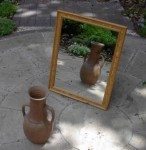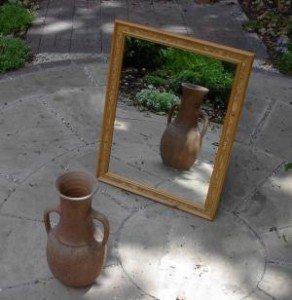The mind is deluded if it is not the awakened mind of a Buddha. A Buddha mind does not divide reality into categories, nor does it like and dislike. Like a mirror, it simply accepts what is and its equanimity is not affected by the scene reflected in it.
Equanimity is the seventh factor of the seven factors of enlightenment. We might think we have experienced equanimity, but we haven’t. It appears in the highest of the meditative states, the immaterial attainments.
A movie screen is another metaphor for the Buddha mind. When fires burn in a movie, the screen remains cool to the touch. When a town floods, the screen remains dry. A movie monster lurks in the dark, and as the hero approaches doom, we think: “No! Turn back!”
Unenlightened life is just like that. We get caught up in the plot and come to believe that what is happening is real. But an enlightened mind remains cool, dry, and free of monsters.
Like a mirror, a movie screen, or a still forest pool, it is unaffected by what seems to be real. It is not indifferent; indifference is evidence of a closed, callous mind. Equanimity is open, soft, and accepting, not indifferent, closed and hard.
The awakened ones understand that the ups and downs of life are just scenes projected onto the movie screens of our minds. They understand that each scene was caused by a previous scene, that each thought, word, or action leads to the next thought, word, or action. And none of it is real because it is impermanent, i.e., lacks an abiding presence.
Our inherent Buddha nature, our true self, is unaffected by the illusions projected onto or reflected by it. Our ignorant self denies that the mind is a movie screen or a mirror, and insists that it is an independent self that experiences the events flickering on the screen or reflected in the mirror.
We live our mundane lives, thinking we are pretty much OK. In fact, we’re a bunch of mindless robots, walking around with deluded minds filled with junk and passing the time by doing stuff we like to do and avoiding stuff we don’t like to do. We live in the dungeon of the unenlightened and are quite proud of it, too dumb to know we’re dumb.
We have to drop our current modes of thinking. Only when we drop our body and mind that we cherish so much can we be liberated from the prison of body and mind. Then we react to events the same way a mirror does. We see clearly and with equilibrium. But that requires meditation and lots of it. Liberation doesn’t come easy. Daily practice for thirty minutes or so is pretty close to the least we can do.
The Four Foundations of Mindfulness in Plain English

